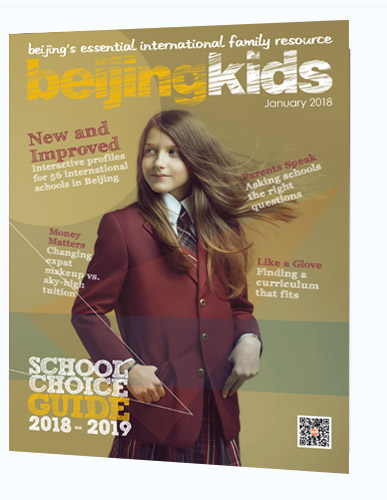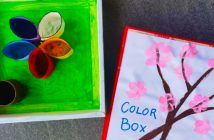This American family of seven has been in Beijing since August 2017. Parents Stuart and Nathalie and their kids Jackson (11) Hallie (8) Daphne (6) Danielle (6) and Julia (3) Orgill chose The International Montessori School of Beijing (MSB) because they wanted their children to have a more integrated Chinese experience. The whole family wants to learn Chinese together and MSB offers a fantastic dual language program that caters to all age levels. The family loves that the Montessori method is married to this dual language program, and that there is an excellent teacher to student ratio which means their children have many encouraging voices to help them through the difficult subjects. The family loves the curriculum because there is a lot of thought put into the practices to help the children gain new skills. This includes learning Chinese culture through poems, writing, and historical context. The curriculum challenges them but they are supported in every step of the way. The young Orgills love that they are encouraged to take a more independent approach to what they are learning. There is such a unique and wonderful international community here, and Stuart and Nathalie can see how it is already beginning to expand the worldview of their children, along with gaining more confidence in making new friends and learning new skills that weren’t a part of their previous educational experiences.
Favorite spot in the school
Jackson: The library and multipurpose hall.
Favorite teacher
Jackson: I really like all of my teachers. One of them is Charles, my music teacher.
Favorite thing about the school
Hallie: The teachers are so kind.
Favorite class
Daphne: art class
Favorite afterschool activity
Danielle: Yoga, I did it as an afterschool activity with my twin sister.
Curriculum Spotlight: Montessori
Founded by Dr. Maria Montessori (1870- 1952) the Montessori motto is “Help me do it by myself.” This approach is founded on the belief that every child should be respected as an individual and allowed to learn at their own pace within the prepared environment of a classroom. The Montessori philosophy acknowledges that a child’s curiosity and interest fuel their drive toward competence, allowing them to learn and progress at their own pace.
Though there are several Montessori societies worldwide, the term “Montessori” itself is not trademarked. That’s why it is crucial for parents to interview and visit prospective schools. The more prominent societies, like the American Montessori Society (AMS), formulate their own standards and accredit schools.
What’s unique about the curriculum?
Montessori education respects the child’s nature in their growth process and creates a child-centered learning environment to help the child to fully reach his potential in order to develop in an all-around way. Montessori education places emphasis on the child’s independence, self-confidence, and a growth mindset. In addition, a Montessori education develops executive function skills such as longer attention spans to graceful social interactions.
How is it applied?
Globally, the age of Montessori students varies widely from infancy to adulthood (0-18 years). The majority of schools in Beijing tend to focus on early childhood education (such as Etonkids and Children’s House), but MSB offers Montessori-style education for kids up to age 12.
Montessori education features are:
1. Mixed-age classrooms.
2. Montessori five classroom areas: practice life, sensorial, math, language, and culture.
3. Scientifically designed learning materials; didactic materials.
4. Prepared learning environment focused on the child, including the physical environment and spiritual environment.
5. Respecting the child’s individual differences, and making an individual teaching and development plan according to the development level of each child.
6. The roles of teachers: directors, supporters, and collaborators
Montessori teachers guide their students. There are no assessments or grading systems; progress is tracked through observation, record-keeping, and self-reflection. There is also no such thing as failure since teachers present each child with a choice of tasks and a variety of difficulties. Kids progress from simple to complex tasks, all while fulfilling their natural curiosity.
Why should parents consider it?
Education experts agree that the most important period in a child’s development is between infancy and age 6. Dr. Montessori believed that kids at this age had an “absorbent mind” like a sponge. The idea is that proper guidance and stimulation will allow them to form patterns for the rest of their lives.
How well does this education system prepare students for the real world?
As self-directed learners, Montessori students gain transferable skills that can be used throughout their lives. The core values are independence, self-esteem, and cooperation. Many Montessori schools in Beijing use a combination of educational approaches.
Where is it offered?
International Montessori School of Beijing (MSB), Etonkids Kindergartens (15 campuses in Beijing).
Photo: Uni You
This article originally appeared on p8-9
of beijingkids School Choice Guide 2018-2019.





